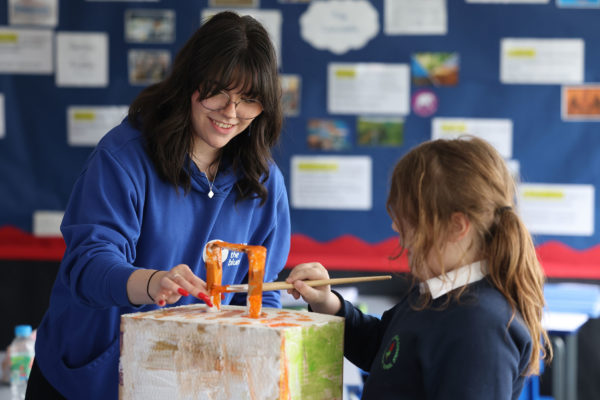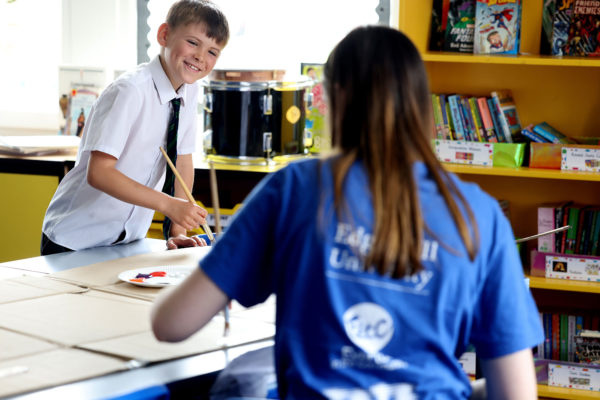A key focus of Tackling the Blues was enhancing the student experience, supporting transitions into highly skilled work, graduate employability outcomes, and wider student health and wellbeing. To inform part of the programme’s KE activity, partners and employers in sport, the arts, education and mental health related sectors were engaged to understand and embed skills and knowledge expected of graduates in all aspects of project design, delivery and evaluation.
In addition, for the Tackling the Blues team to understand the type of highly skilled jobs previous students working on the project have secured, the team worked with the University’s Careers Team to contact these alumni to engage in the project’s evaluation.
As in other areas of higher education practice, it is important to consider the following when engaging students in KE activity:
• What, if anything, do students want from engaging in KE activity? How can this be addressed given the resources available?
• What do students understand by KE, and are there any barriers to engagement in KE activity which need to be addressed when setting up projects?
• How can you work inclusively and meaningfully with diverse groups of students throughout all aspects of project design, delivery and evaluation?
• How can you maximise opportunities for students to obtain as many of the intended benefits as possible?
• How can you tailor your project to graduate employability skills, experiences and needs, and related these to institutional policy and practice?
• How can you work with institutional careers teams and other internal stakeholders to support students’ preferred engagement in KE and highly skilled work?
• What opportunities can be provided to all students to engage in real-world highly skilled work, and how can any challenges to this be effectively overcome?
• Which strategically important partners can you engage with to support students’ engagement in KE and other employability activity?
Collaborative working within and between HEIs, businesses and community organisations is essential to the success of KE activities and the contribution to economic, social and cultural outcomes in local communities.
The ways in which Tackling the Blues engaged in collaborative working included:
• Working across academic and support departments, especially the University Careers Team
• Innovative collaboration between the University, a community sports organisation (EitC) and a national art gallery (Tate Liverpool)
• Students working with project staff to deliver Tackling the Blues in primary and secondary schools across Merseyside and West Lancashire
• Engaging with additional national external partner organisations (Chasing the Stigma) to deliver certified training
• Weekly operational meetings and at least quarterly steering group meetings held online and in-person
Things to consider when developing a collaborative community-focused KE project:
• Engage with academic and other support departments to identify locally relevant priorities and how these can be addressed through the project
• Work inclusively with diverse groups of students to facilitate engagement in, and understanding the benefits of, KE activity
• Ensure students are central to the conception, delivery and evaluation of projects and provide a safe, non-judgemental, space for them to share ideas and needs to be addressed
• Work with organisations and businesses in the local community with a shared mission and vision which supports students’ engagement in, and experience of, KE
• Develop a mutually beneficial dedicated project team of staff with diverse skill sets and knowledge bases which collectively underpin the design, delivery and evaluation of projects
The project team worked together under the Tackling the Blues brand and drew upon their respective expertise and experience as a partnership in various ways. This partnership-led approach included:
• Staff at each partner organisation contributing equally to the shared management and delivery of the project through steering group meetings, operational group meetings and on the ground delivery activity
• Agreeing the respective roles and responsibilities of all partners at the start of the programme, with regular review and reflection opportunities embedded into scheduled meetings
• Agreed agenda setting and identification of prioritised aims and objectives at the outset of the project, with clear indicators of success and outcome measures
• Developing equitable and ethical ways of working and respect for each partner’s priorities, with agreed strategies for addressing these via open and honest communication pathways
• Ensuring partner priorities, outcomes and motivations were regularly reviewed and considered during all decision-making processes
• Valuing diverse and inclusive forms of lived experience, knowledge and other insight and ensure these shape all elements of the project as appropriate
• Co-branded project resources, communications and social media output which communicate individual and collective partner values, missions and priorities
• Sharing individual and collective assets (e.g. facilities, human and other resources, previous knowledge, networks) to leverage intended benefits
An important feature of all projects are their intended and unexpected outcomes, and how these can be understood and explained, including in relation to relevant policies and practice. For this project, the eight principles of the KE concordat were important in shaping outcome identification and production. We retained a focus on outcomes through our partnership approach described above and by:
• Collaborating with businesses and community groups to identify their preferred outcomes and how these might be best monitored and evaluated
• Offering relevant training to project staff and student mentors and volunteers
• Aligning the project to the University’s KEF action plan outcomes and wider KE priorities
• Holding regular de-brief sessions on progress made against agreed outputs and outcomes, and identified any barriers or opportunities to their achievement
• Conducting regular reviews of practice as part of an agreed partnership approach to embedding a culture of continuous development and improvement into all areas of activity
• Working with various internal and external stakeholders to ensure understanding of the eight principles of the KE concordat, why these are important, and how KE can be used to underpin the student experience, transitions to highly skilled work, and support health and wellbeing
All aspects of project design and delivery was evidence-based and underpinned by research undertaken previously at Edge Hill University and elsewhere. Two dedicated research assistants led the monitoring and evaluation of the project and were supported by senior researchers and managers. Given the importance of evidencing the impact and effectiveness of KE projects such as Tackling the Blues, it is important to consider:
• Identifying dedicated staff to lead the research and all monitoring and evaluation activity
• Engaging all stakeholders and beneficiaries in equitable research activity agreed at the outset of the project
• Processes for providing regular research updates to all partners, with opportunities provided for continuous discussion, reflection and development
• Building in research priorities of partner organisations and identifying agreed ways of reporting research findings to them
• Aligning the evaluation and evidence to the principles of the KE Concordat and other policies, including institutional ones
• Disseminating research findings to all relevant audiences including academics, communities and schools in audience appropriate ways
• Opportunities for engaging participants and other publics in the research through agreed dissemination activity


